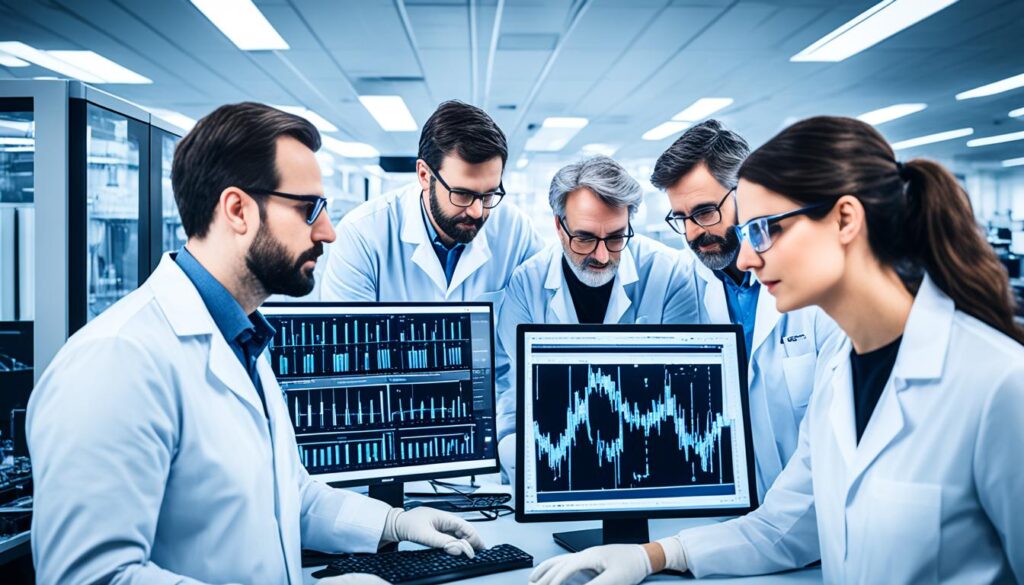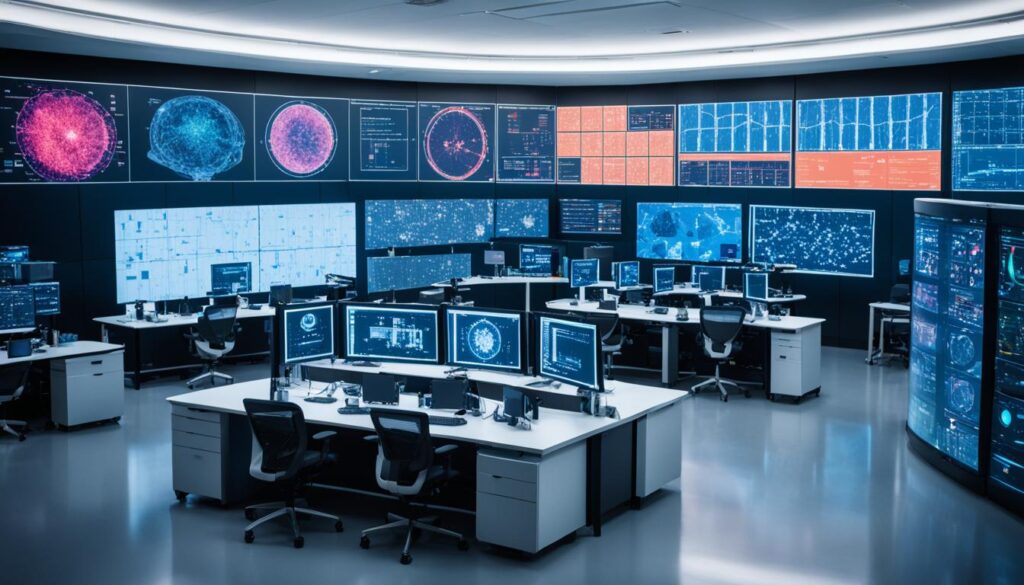Science is changing fast, thanks to artificial intelligence (AI). AI is a powerful tool that’s changing how we do research. It helps speed up discoveries, improve data analysis, and make scientific simulations better.
AI can look through huge amounts of data quickly and accurately. It finds patterns and connections that humans might miss. This has led to big discoveries in fields like astrophysics, genomics, and climate science.
AI is also changing how we simulate and experiment. It uses its computing power to simulate complex systems better and faster. This helps us understand the world more deeply, from tiny particles to big climate changes.
AI helps scientists share their work too. It makes complex data easy to see and understand. This helps scientists work together better and inspires new discoveries.
The future looks bright for AI and science. AI will help us predict things like weather and earthquakes. It’s also making sharing scientific ideas easier, helping scientists work together more smoothly.
AI’s role goes beyond these areas. It will be key in solving big global problems. From making the planet more sustainable to improving healthcare, AI and science together can tackle big challenges.
In conclusion, AI has brought a new era to science. It helps researchers make faster discoveries and work more efficiently. With AI, the future of science is full of possibilities, changing how we see the world and how we solve problems.
Revolutionizing Scientific Discoveries
Artificial intelligence (AI) is changing the way we do scientific research. It opens new doors for big discoveries. AI helps researchers go through huge amounts of data to find patterns and insights we couldn’t see before.
Thanks to AI, scientists can quickly test ideas, simulate complex things, and make decisions based on data. This makes scientific discoveries happen faster.
AI’s Impact on Data Analysis
AI has changed how scientists work. It uses machine learning to find important information in big datasets. This helps scientists see connections and trends they missed before.
This fast analysis lets scientists come up with new ideas and check their theories quickly and accurately.
Accelerating Breakthroughs
AI and scientific research together are starting a new era of discovery. AI’s predictive analytics and simulations let scientists study complex systems and predict outcomes with great accuracy. This speeds up scientific discoveries.
Scientists can now quickly test their ideas, improve their methods, and make decisions based on data. This pushes their work forward.
Enhancing Scientific Simulations
Artificial intelligence (AI) is changing the world of science. It’s making a big difference in scientific simulations. Now, AI helps create very accurate virtual simulations. This lets researchers study complex systems and phenomena in great detail.
AI lets scientists test ideas, improve processes, and predict results without real-world limits. This helps researchers understand more and move science forward faster. It opens the door to new discoveries.
Predictive modeling is a big part of AI in simulations. It helps scientists predict how complex systems will act. This is useful for studying everything from natural events to how living things work. AI is changing how scientists do their jobs.
AI combines computational modeling and virtual experiments to let researchers dive deep into complex systems. This approach speeds up scientific discoveries. It also lets researchers explore new areas, expanding our knowledge.
Science and AI Collaboration
Artificial intelligence (AI) and scientific research are now working together in a new way. This partnership brings together scientists and AI experts to find new solutions. They are tackling complex problems like never before, from analyzing data to designing experiments.
Interdisciplinary Approaches
When AI and science team up, they create something powerful. Scientists use AI’s ability to spot patterns and do complex calculations to speed up discoveries. At the same time, AI experts learn more about the world by working with scientists. This teamwork leads to new ideas and ways to apply them.
Ethical Considerations
As AI plays a bigger role in science, we must think about the right way to use it. We need to talk about things like keeping data safe, making sure AI doesn’t unfairly discriminate, and making sure AI is developed responsibly. By focusing on ethical AI, we can make sure this partnership benefits everyone fairly and stays true to scientific values.

AI-Driven Precision in Experimentation
The world of scientific research is changing fast, thanks to AI. AI is making experiments more precise and efficient. Scientists can now do more with less effort.
AI helps automate tasks, giving researchers more time. It makes collecting, analyzing, and understanding data easier. This means scientists can focus on the important parts of their work. It speeds up research and leads to better decisions based on data.
Optimizing Research Processes
AI does more than just automate tasks. It helps make experiments better by optimizing settings. AI uses complex algorithms to look through big datasets, find patterns, and suggest improvements. This makes research more reliable and trustworthy.
Adding AI to research is a big step forward. It’s changing how we do research for the better. With AI, scientists can achieve new levels of precision and efficiency. This leads to faster progress in science.
Empowering Scientific Visualization
AI is changing how scientists explore and share their work. It lets them make dynamic simulations and high-resolution images. This makes their research come alive and easier to understand.
AI is making data visualizations interactive and immersive. Scientists can now simulate complex natural events and see tiny structures clearly. This new way of showing science is not just more fun but also better at sharing complex ideas.
As AI and data visualization grow together, scientists are set for new discoveries. AI helps researchers see their work in new ways, leading to big advances in fields like physics and biology.
Predictive Modeling in Science
Artificial intelligence is changing how we predict natural events. It uses advanced algorithms to look at lots of data. This helps scientists make accurate models for things like weather, climate change, and natural disasters.
This new ability helps us understand the world better. It also helps us make better decisions and tackle big global problems. AI-driven predictive modeling is changing environmental science. It lets us see and prepare for natural phenomena effects on our communities and nature.
Forecasting Natural Phenomena
Thanks to AI-driven predictive modeling, scientists can predict climate and weather events more accurately. They use historical data, satellite images, and real-time sensor info. This helps them spot trends and predict environmental science events.
This helps people in charge, city planners, and emergency teams make smart choices. They can use resources well and take steps to lessen the effects of natural disasters and climate changes. AI is changing how we deal with the forces that shape our planet.
Science and the Future of AI
The mix of AI and science is changing fast, opening up new chances for big discoveries and tech leaps. Scientists and AI experts are working together to explore new areas like quantum computing and nanotechnology. This team-up is set to open new doors in understanding, change how we do research, and speed up scientific progress like never before.
Pushing the Boundaries
AI is changing how we do scientific research, giving scientists new tools. It helps with data analysis and simulations, opening new paths for discoveries. Quantum computing, which could change how we compute, is one area where AI and science are making big strides.
Nanotechnology, working with matter at the atomic level, is also getting a boost from AI. As these technologies grow, science’s future looks set to be transformed, starting a new era of innovation and discovery.
Science and AI are working together across many fields, leading to new ways to solve big global problems. They’re tackling issues like climate change and improving healthcare. This partnership is changing how we see and interact with the world.
AI’s Role in Scientific Communication
Artificial intelligence is changing how we share scientific info. It uses AI tools to help scientists share their work better. These tools make presenting findings easier and help with collaboration.
AI makes sharing discoveries easier. Tools can turn complex data into clear documents quickly. This saves scientists time. AI also helps find important research papers, making sharing knowledge easier.
AI is big in data visualization too. It turns hard data into easy-to-understand visuals. This helps scientists share their work better. AI finds patterns in data, making research more impactful.
Using AI in science helps spread research further. It leads to more collaboration and progress. As AI grows, it will play a bigger part in science, pushing discovery forward.
Unveiling the Mysteries of Science
The link between AI and science is getting stronger, making it easier to explore the universe’s secrets. AI helps scientists dive into new areas, find key research, and make big scientific discoveries.
AI is helping us understand the human genome and the cosmos better. It changes how we see and understand the world. With AI, we can analyze, simulate, and predict things in new ways.

AI is helping scientists solve old puzzles and explore the unknown. This mix of AI and science is expanding what we know. It’s letting us discover things we couldn’t before.
Using AI in science opens up endless possibilities for solving the universe’s secrets. The future of science looks bright with AI’s help. It’s creating a new era of discoveries and breakthroughs.
Addressing Global Challenges
Artificial intelligence is changing how we handle the world’s big problems. It uses AI to find new ways to deal with issues like climate change and not having enough resources. These technologies help us understand complex environmental issues better. They also help us manage resources better and lessen the harm our actions cause to the planet.
AI-Powered Sustainability Solutions
AI is key in promoting sustainable practices in many areas. It looks at huge amounts of data to find patterns and trends. This helps people in charge, businesses, and communities make better choices about energy use, waste, and renewable energy.
By using AI, we can find new ways to make our future more sustainable.
Revolutionizing Healthcare and Medicine
AI is changing healthcare and medical research in big ways. It helps find diseases early and accurately, and tailor treatments to each person. AI also speeds up finding new medicines and helps us understand complex diseases better.
This could lead to better health outcomes, lower healthcare costs, and better lives for people everywhere.
The Future of AI and Science Collaboration
The partnership between AI and science is growing fast. We must think carefully about ethics and promote responsible innovation. It’s important to protect data privacy, reduce algorithm bias, and make sure AI technology is fair for everyone.
Ethical Considerations and Responsible Innovation
By talking across disciplines and focusing on ethics, science can make huge strides and have a big positive impact. This way, AI can be a game-changer, leading to new discoveries while being honest and socially responsible.
As we look to the future of AI and science working together, we need to stay alert to the challenges ahead. Issues like data privacy and making algorithms fair are key. By tackling these problems with careful planning and a commitment to doing things right, we can make the most of this powerful partnership. This will lead to a new era of science that helps everyone.



